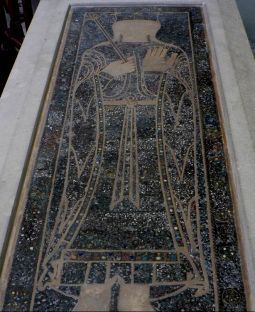#galswintha regina
Explore tagged Tumblr posts
Note
What is the novel in which Galswintha is raped while being murdered? I'd like to avoid it, it seems like too much! Like, this woman was killed in her bed, probably by her husband's order (others said it was her "rival" Fredegonde, who knows), so it is already a horrible situation, why make it even worse?
I’m sorry, anon, I haven’t found it, though I would say I’m not that sorry about it cause, you know... it was... yikes... That it to say, while searching for it, I check in several novels and don’t found it in the most known of them, so I guess you would not fall on it, if I can reassure you... But I’m not really surprised, poor Galswintha has been a sexual object since the 19th century at least, if you considere this painting, Le Meurtre de la reine Galswinthe, from Eugène Philastre.

It’s not because it is actually seen as “art” that there is not a problem with its subject, i.e. a naked woman being molested...
The only purpose for rape scenes is always drama only... And even if it’s painful to say it, the Merovingian dynasty is a huge possibility for shitty or creepy writers who have a kink with rape... Just with the few novels I have checked, three at least had a Fredegund who have been raped during childhood or pre-teen years, and then became a lewd woman who use her sexuality as a weapon... This is disgusting...
1 note
·
View note
Photo






MEROVINGIAN REGINAE | Fredegund Regina († 597)
Third principal wife of Chilperich I Rex, to whom she bore five sons, Chlodobert Rex, Samson Rex, Dagobert Rex, Theodorich Rex and Chlothacar II Rex, and one daughter, Rigund Regina. As Chilperich’s wife, she may have lived between several civitates, such as Rotomagus (Rouen), Parisius ( Paris), Sexonas (Soissons) or Brennacum (Berny).
According to Gregorius of Tours, she was already his favourite even before the wedding with Galswintha Regina in 567, and despite the fact he had to put aside his whole women and concubines for this wedding, including his first chief wife, Audovera Regina, he quickly took her back near him. Even if we do not know exactly when or why, it must have been because she bore him her first son Chlodobert Rex, much to the anger of Galswintha Regina, who felt outraged by her presence.
“[...] promittens per legatus se alias relicturum, tantum condignam sibi regisque prolem mereretur accipere. [...] Quae cum ad Chilpericum regem venisset, cum grande honore suscepta eiusque est sociata coniugio; a quo etiam magno amore diligebatur. Detulerat enim secum magnos thesauros. Sed per amorem Fredegundis, quam prius habuerat, ortum est inter eos grande scandalum.
He told the messengers to say that he promised to dismiss all the others, if only he were considered worthy of marrying a King’s daughter of a rank equal to his own. [...] When she reached the court of King Chilperic, he welcomed her with great honour and made her his wife. He loved her very dearly, for she had brought a large dowry with her. A great quarrel soon ensued between the two of them, however, because he also loved Fredegund, whom he had married before he married Galswinth.”
DLH, IV 28. De uxoribus Chilperici
After the death of Galswintha Regina in 568, she officially became Chilperich’s new chief wife and gave birth to all of his other children. Basing on the sources, he apparently remained faithful to her and did not take other significant concubine. Fredegund seemed to have been very popular and loved by the people, and was also known as being a good administrator and landowner, as she was able to raise money and numerous gifts for her daughter’s dowry.
“Sed et mater eius inmensum pondus auri argentique sive vestimentorum protulit, ita ut videns haec rex nihil sibi remansisse potaret. Quem cernens regina commotum, conversa ad Francus, ita ait: ‘Ne potitis, viri, quicquam hic de thesauris anteriorum regum habere; omnia enim quae cernetis de mea proprietate oblata sunt, quia mihi gloriosissimus rex multa largitus est, et ego nonnulla de proprio congregavi labore et de domibus mihi concessis tam de fructibus quam tributis plurima reparavi. Sed et vos plerumque me muneribus vestris ditastis, de quibus sunt ista quae nunc coram videtis; nam hic de thesauris publicis nihil habetur’.
Her. mother added a vast weight of gold and silver, and many fine clothes. When he saw this, King Chilperic thought that he had nothing left at all. Queen Fredegund realized that he was upset. She turned to the Franks and said: ‘Do not imagine, men, that any of this comes from the treasures amassed by your earlier kings. Everything you see belongs to me. Your most illustrious King has been very generous to me, and I have put aside quite a bit from my own resources, from the manors granted to me, and from revenues and taxes. You, too, have often given me gifts. From such sources come all the treasures which you see in front of you. None of it has been taken from the public treasury’.”
DLH, VI, 45. De nuptiis Rigunthae, filiae Chilperici
However she had to face the death of almost all her sons: Samson in 577, Chlodobert and Dagobert in 580 during the Plague of the Gauls, and then Theodorich in 584. The same year, her husband was brutally killed, leaving her alone with her last son, Chlothacar II Rex, who was barely 4 months, and her daughter Rigund Regina, at that time on the road to marry Reccared, heir of Toledo. She seized the royal treasure and took refuge in the Basilica Saint-Étienne de Paris, claiming the role of regent over the regnum Neustria, and placing herself under the protection of Guntchramn Rex and Bishop Ragnemod of Parisius.
“Interea Fredegundis regina iam viduata Parisius advenit et cum thesauris, quos infra murorum septa concluserat, ad aeclesiam confugit adque a Ragnemodo fovetur episcopo.
Meanwhile the widowed Queen Fredegund arrived in Paris. She took with her that part of her treasure which she had secreted within the city walls, and she sought sanctuary in the cathedral, where she was given protection by Bishop Ragnemod.”
DLH, VII, 4. Quod Fredegundis in aeclesia confugit
As Guntchramn was having doubts on the parentage of her baby, she summoned an assembly of 3 bishops and 300 nobiles who all attested of her honorability and officially named the baby Chlothacar.
“Interea Fredegundis regina iam viduata Parisius advenit et cum thesauris, quos infra murorum septa concluserat, ad aeclesiam confugit adque a Ragnemodo fovetur episcopo.
Meanwhile the widowed Queen Fredegund arrived in Paris. She took with her that part of her treasure which she had secreted within the city walls, and she sought sanctuary in the cathedral, where she was given protection by Bishop Ragnemod.”
DLH, VII, 4. Quod Fredegundis in aeclesia confugit
She also managed to save her daughter, who was taken as an hostage by Dux Desiderius after the new of her father’s death, and threaten to be taken in marriage by force by the pretender Gundovald.
“Fredegundis autem his diebus Chuppanem in Tholosano direxit, ut scilicet filiam suam exinde quocumque modo possit eruere. [...] acceptam Rigundem a loco illo reduxit, non sine grande humilitate adque contumilia.
At this time Fredegund sent Chuppa into the Toulouse area to bring home her daughter Rigunth by hook or by crook. [...] so he took Rigunth, humiliated and insulted as she was, and brought her home instead.”
DLH, VII, 39. Quod idem emisit qui Brunechildem lederet
Facing multiple oppositions because of her new position, she managed to secure herself with various allies among the nobiles and neutralized her major opponents, such as Bishop Praetextatus, who resented her for many years. As a regent, she was known as being fearless and cunning, rendering justice, and even challenging her brother-in-law Guntchramn on some matters, such as negociations with Hispania while he strictly forbidden it, or with Brittany in 586.
“Sed et Warocum nuntios dirigit, ut, qui adhuc captivi in Brittaniis de exercitu Gunthchramni regis retenebantur, pro huius vita absolverentur. Quod ita Warocus implevit.
[S]he sent messengers to Waroch, ordering him to set free the prisoners from King Guntram’s army whom he was still holding in Brittany. Waroch did as he was told.”
DLH, X, 11. De infirmitate Chlothari iunioris
Despite their mutual hostility, they pursued diplomatic relationship and she was regarded as the true leader of the west regnum during the whole minority of Chlothacar, even leading military expeditions with him. She was also a pious woman, who made several donations to churches and basilicas.
“Sed cum eum Fredegundis, mater eius, disperatum vidisset, multum pecuniae ad basilicam sancti Martini vovit, et sic puer melius agere visus est.
When Fredegund, the mother of Lothar, saw how desperately ill he was, she vowed that she would donate a great sum of money to the church of Saint Martin.”
DLH, X, 11. De infirmitate Chlothari iunioris
She eventually died of natural causes in 597, in Parisius and was buried near her husband into the Basilica Sainte-Croix-et-Saint-Vincent (actual abbey of St. Germain-des-Prés), in Parisius (Paris). Her grave, which had been identified thanks to a later tombstone, had been moved during the 19th century in the Basilica of St. Denis, where it is still nowadays.
“Anno secundo regni Teuderici Fredegundis moritur.
The second year of Theuderic’s reign, Fredegund dies.”
Chron, IV, 17. De Fredegunde, quod Parisius invasit, et pugna contra Teudeberto

Fredegund’s grave in St. Denis

Detail of the tombstone
#historyedit#perioddramaedit#women in history#merovingian queens#merovingian reginae meme#fredegund regina#6th century#my queen!!!!!#i love her as much as infinity!#next move i want to see her grave ;A;
158 notes
·
View notes
Photo






MEROVINGIAN REGINAE | Brunehilde Regina († 613)
Chief wife of Sigebert I Rex, to whom she gave two daughters, Ingund II Regina and Chlodosuinda III Regina, and one son, Childebert II Rex, she is probably one of the most powerful women of her time.
Although her date of birth remains unknown, we know that she was the youngest daughter of Athanagild of Toledo and his wife Goiswintha, and that she had an older sister, Galswintha Regina.
“Nam Galsuintha aetate senior a Brunichilde erat.
Galswinth was older than Brunhild.”
DLH, IV, 28. Quod Sigiberthus Brunichildem accepit
In 566, she married Sigebert I Rex, and remains his only known consort. As Sigebert’s wife, she may have lived in Mettis (Metz) or Colonia (Cologne), principal civitates of his regnum.
“Porro Sigyberthus rex cum videret, quod fratres eius indignas sibimet uxores acciperent et per vilitatem suam etiam ancillas in matrimonio sociarent, legationem in Hispaniam mittit et cum multis muneribus Brunichildem, Athanagilde regis filiam, petiit.
King Sigibert observed that his brothers were taking wives who were completely unworthy of them and were so far degrading themselves as to marry their own servants. He therefore sent messengers loaded with gifts to Spain and asked for the hand of Brunhild, the daughter of King Athanagild.”
DLH, IV, 27. De uxoribus Chilperici
The next year, in 567, her sister married too in the Gauls, and became the principal wife of Chilperich I Rex, half-brother of Sigebert. However, the marriage did not last long and Galswintha was found dead in her bed after only one year of marriage.
“Quae cum ad Chilpericum regem venisset, cum grande honore suscepta eiusque est sociata coniugio; a quo etiam magno amore diligebatur. Detulerat enim secum magnos thesauros. Sed per amorem Fredegundis, quam prius habuerat, ortum est inter eos grande scandalum. Iam enim in lege catholica conversa fuerat et chrismata. Cumque se regi quaereretur assiduae iniurias, perferre diceretque, nullam se dignitatem cum eodem habere, petiit, ut, relictis thesauris quos secum detulerat, libera redire permitteretur ad patriam. Quod ille per ingenia dissimulans, verbis eam lenibus demulsit. Ad extremum enim suggillari iussit a puero, mortuamque repperit in strato.
When [Galswinth] reached the court of King Chilperic, he welcomed her with great honour and made her his wife. He loved her very dearly, for she had brought a large dowry with her. A great quarrel soon ensued between the two of them, however, because he also loved Fredegund, whom he had married before he married Galswinth. Galswinth was converted to the Catholic faith and baptized with the chrism. She never stopped complaining to the King about the insults which she had to endure. According to her he showed no respect for her at all, and she begged that she might be permitted to go back home, even if it meant leaving behind all the treasures which she had brought with her. Chilperic did his best to pacify her with smooth excuses and by denying the truth as convincingly as he could. In the end he had her garrotted by one of his servants and so found her dead in bed.”
DLH, IV, 28. De uxoribus Chilperici
As she was childless, according to the law, all her possessions and properties had to pass to her legal heir, i.e. her sister Brunehilde Regina. As this inheritance would have deprived him of major cities of his regnum, Chilperich I Rex refused Brunehilde’s rights on it, and Sigebert called for a mediation, but the two brothers did not reach an agreement and grew an hostility between them.
In 575, due to this common hostility and to several military assaults, Sigebert called a war against his brother and successfully led an army to the west, in the future Neustria. Brunehilde followed him with her children, and was present in Parisius (Paris) when her husband was ultimately killed, perhaps on the orders of Chilperich I Rex who had been forced to retreat in the civitas of Turnaco (Tournai). Taken as a prisoner and deprived of all of her treasuries, she was exiled in Rotomagus (Rouen), separated from her daughters who were send to Meldicus (Meaux), meanwhile her son was taken in charge by nobiles and crowned new rex over Mettis (Metz) at 5.
“Igitur interempto Sigybertho rege apud Victuriacum villam, Brunichildis regina cum filiis Parisius resedebat. Quod factum cum ad eam perlatum fuisset et, conturbata dolore ac lucto, quid ageret ignoraret, Gundovaldus dux adpraehensum Childeberthum, filium eius parvolum, furtim abstulit ereptumque ab immenente morte, collectisque gentibus super quas pater eius regnum tenuerat, regem instituit, vix lustro aetatis uno iam peracto. Qui die dominici natalis regnare coepit. Anno igitur primo regni eius Chilpericus rex Parisius venit adpraehensamque Brunichildem apud Rodomaginsem civitatem in exilio trusit thesaurisque eius, quos Parisius detulerat, abstulit; filias vero eius Meledus urbe tenire praecipit.
At the moment when King Sigibert was killed in Vitry, Queen Brunhild was in residence with her children in Paris. When the news was announced to her, she was prostrate with anguish and grief, and she hardly knew what she was doing. Duke Gundovald took charge of her little son Childebert and removed him from her in secret, snatching him from certain death. Gundovald assembled the people over whom Sigibert had reigned and proclaimed Childebert King, although he was barely five years old. Childebert began to reign on Christmas Day. In the first year of Childebert’s rule, King Chilperic came to Paris, seized hold of Brunhild, banished her to the city of Rouen and took possession of the treasure which she had brought to Paris. He ordered her daughters to be held in custody in Meaux.”
DLH, V, 1. De Childeberthi iunioris regno et matre eius
During her captivity, she was visited by Merovech Rex, son of Chilperich I Rex, who then married her with the help of his godfather, Bishop Praetextatus, perhaps in order to strengthen his own power; Brunehilde’s consent on this matter is unknown, and it is probable that she was actually married by force rather than falling in love with a young man, as some scholars want to see it... However, since they were aunt and nephew, the marriage was contrary to the canon law, and Chilperich rapidly intervened to separate them: Merovech was tonsured to nullify the ceremony, and Brunehilde sent away with her daughters to reunite with her son, in Austrasia.
She then sought the regency on behalf of her son, even if she had to face the strong disapprobation of the nobiles, mostly the powerful Gogo. From 576 to 583, she nonetheless personified the true power in Austrasia, building up political alliances, such as with her brother-in-law Guntchramn Rex or with Hispania through the marriage of her daughter Ingund II Regina to prince Hermenegild, and was known as an excellent administrative reformer. She also had to face some opposition against her, such as the conspiration led in 587 by three nobiles, Rauchingus, Ursio and Berthefredus, who tried to assassinate her and Childebert. As the regina-mother, she seemed to maintain herself within in her family, as she had a devoted (and perhaps low-ranking) daughter-in-law, Faileuba Regina, who never tried to challenge her superiority.
In 587 again, she attended with her daughter Chlodosuinda III Regina and Faileuba Regina, to the Treaty of Andelao (Andelot), where Childebert and Guntchramn agreed on Guntchramn’s succession and the future of the women when they both would be dead: she was reaffirmed in her own rights as the heir of her sister and as the mother of the rex. She also initiated a correspondence with both byzantine emperors and pope Gregorius, and personally intervene when her daughter Ingund II had to fled the Hispania and tried her best to take her home with her child, however in vain.
Upon the death of her son in 596, she pursued her ruling by being appointed regent again on behalf of her two grandsons, Theodorich II Rex, rex over Burgundia, and Theodebert II Rex, rex over Austrasia. But she started to find resistance in the person of her granddaughter-in-law, Bilichildis I Regina, a former slave-girl she had trained. With new opposition from the nobiles, she was forced in 599 to retire from Austrasia, where she was actually living, and joined Theodorich in Burgundia with her granddaughter, Theodelina Regina.
“Eo anno Brunechildis ab Austrasies eiecta est et in Arciacinsem campaniam a quidam homini paupero singula reperitur. Secundum eius peticionem ipsam ad Teuderico perduxit. Teudericus aviam suam Brunechildem libetner recipiens gloriose honrat.
This year, Brunhild was driven out by the Austrasians. A poor man meets her, all alone, near Arcis in Champagne. In accordance with her wishes, he led her to Theuderic. Theuderic welcomes his grandmother Brunhild and covers her with honor.”
Chron, IV, 19. De Brunechilde, qualiter de Auster est egecta
She quickly became a prominent figure of Theodorich’s immediate entourage, and dominated his inner-court, even avoiding, according to the sources, the consumption of his marriage with the wisigothic princess, Ermenberga.
With her new advisor, Protadius, she started to form a faction waging war against Chlothacar II Rex, who was actually growing in importance, and tried to maintain diplomatic relationship with Theodebert II Rex and Bilichildis, with whom she entertained a regular correspondence. She was an important religious builder with three major foundations in Augustodunum (Autun), even if she also had troubles with religious men, especially with Colombanus who accused her great-grandchildren of being bastards because they were born from concubines and not from a wedded wife.
In 613, after the death of Theodorich II Rex, and in absence of a powerful mother to claim the guardianship, she became regent for the third time, for her great-grandson, Sigebert II Rex, still a child. But Warnacharius II, Maior Palatii of Burgundia, alongside Pippin I and Arnulf of Mettis, resentful towards her, abandoned her cause and joined Chlothacar II Rex that they recognized as the rightful leader of the Franks.
Betrayed by the rest of her leading nobiles, she fled with Theodelina, but they were arrested and delivered in Rionava (Renève) to Chlothacar, who accused her of the murders of ten reges and then sentenced her to death with her young great-grandsons. She was tortured and humiliated in front of the whole army, then tied by foot and hair to a wild horse and torn apart. The remains of her body were burnt and the ashes buried in the Abbey of Saint-Martin d’Autun that she had founded in 602.
“Factionem Warnachariae maioris domus cum reliquis maxime totis procerebus de regnum Burgundiae Brunechildis ab Erpone comestaboli de pago Vltraiorano ex uilla Orba una cum Theudilanae germana Theuderici producitur et Chlothario Rionaua uico super Vincenna fluuio presentatur. [...] Chlotharius, cum Brunechildis suum presentatur conspectum et odium contra ipsam nimium haberit, repotans ei eo quod decem reges Francorum per ipsam interfecti fuissent - id est Sigybertus et Meroeus et genitor suos Chilpericus, Theudebertus et filius suos Chlotharius, item Meroeus filius Chlothariae, Theudericus et eiusdem filiae tres, qui ad presens estincti fuerant - per triduo eam diuersis tormentis adfectam, iobetque eam prius camillum per omne exercito sedentem perducere, post haec comam capitis, unum pedem et brachium ad ueciosissemum aequum caudam legare: ibique calcibus et uelocitate cursus membratim disrumpetur. .
Following the maneuvers of Warnacharius, the mayor of the palace, and of almost all the other great men of the kingdom of Burgundy, Brunhild, at the same time as Theodelane, Theuderic's sister, was led out of the domain of Orbe by the count Herpo in the district of Jura and was presented to Clothar in the village of Renève, on the Vingeanne. [...] Clothar, before whom Brunhild is presented and who harbored a lively hatred towards him, imputes to her the murder of ten kings, namely Sigebert and Merovech, as well as their father Chilperic, Theudebert and his son Clothar, a another Merovech, Clothar's son, Theuderic and his three sons, who had just been killed. After having inflicted various torments on her for three days, he ordered that she be led through the whole army perched on a camel, then tied by the hair, a foot and an arm to the tail of a particularly fiery horse. Then she was tied to the feet of wild horses and torn apart limb from limb.”
Chron, IV, 42. De quod Chlotarius regnum Burgundiae et Auster recipit et filius Teuderici occisit
#historyedit#perioddramaedit#women in history#merovingian queens#merovingian reginae meme#brunehilde regina#merovingian period#6th century#7th century#mine#she's very fascinating#but also difficult to handle#actually i think a lot of scholars totally misunderstand her#too much sources on her#i had to chose because the post was already long enough!
121 notes
·
View notes
Note
In your opinion, which Merovingian queens had the greatest love stories or at least the best partnerships with their kingly husbands? Do you think those royal couples feelings were mutual for each other especially on the women's sides?
Well, this is pratically impossible to have a real statment on that matter, because we don’t have any sources from both parts, either reges or reginae. No one has left poetry, letters or significant pieces of art we could use to draw a conclusion about their feelings as a couple. And the only one whom we are pretty well informed about (Chilperich and Fredegund), well they are the only ones... so it’s difficult to say if this is a normal type of relationship for ruling couples of that period or if we can see a real affection towards each other, especially when you read through Gregorius of Tours that Chilperich cared deeply for her, travelled with her and asked her her opinion regularly. So it’s impossible to say truly if these couples were in love with each other or if this is just a way to conduct yourself when you’re a ruler.
That being said, we have sometimes some hints:
Guntchramn has exiled two bishops and killed two men for Austregildis’ honor;
Charibert I suffered from excommunication rather than dismissing his beloved Marcovefa;
Theodebert I litteraly fought with his optimates during 7 years in order to live with Deoteria instead of his fiancee Wisigardis;
Chlothacar II mourned deeply Beretrudis whom he was highly infatuated with according to Fredegar;
Childebert I stayed married to the same wife his whole life, even if she didn’t give him a son and heir;
Chilperich I favoured Fredegund and couldn’t bear to get separated from her even for a year, resulting in the complication of his wedding with Galswintha.
17 notes
·
View notes
Photo






MEROVINGIAN REGINAE | Audovera Regina († af. 580)
Probably the first chief wife of Chilperich I Rex, to whom she bore three sons, Theodebert Rex, Merovech Rex and Chlodovech Rex, and at least one daughter, Basina II Regina.
According to Gregorius of Tours, she was the most influential wife of Chilperich before the year 567, as the mother of three sons.
“Habebat autem tunc Chilpericus tres filius de Audovera priore regina sua, id est Theudoberthum, cui supra meminimus, Merovechum atque Chlodovechum.
Chilperic had three sons by one of his earlier consorts, Audovera: these were Theudebert, about whom I have told you already, Merovech and Clovis.”
DLH, IV, 28. De uxoribus Chilperici
As the wife of Chilperich, she might have lived in Sexonas (Soissons), the capital city of his regnum. Even if stories have made her the archenemy of Fredegund Regina, Gregorius never said a word about a potential hatred between the two women: they must have had cordial relations as Audovera was already the mother of three sons, when Fredegund did not have any son yet.
In 567, as Chilperich asked for the hand of the wisigothic princess Galswintha, a special request from King Athanagild of Toledo forced him to get separate of all his precedent wives in order to marry his daughter. Therefore, Audovera was officially dismissed alongside the others women of the harem and retired in an unknown place, perhaps with her daughter Basina.
“Quod videns Chilpericus rex, cum iam plures haberet uxores, sororem eius Galsuintham expetiit, promittens per legatus se alias relicturum, tantum condignam sibi regisque prolem mereretur accipere.
When he saw this, King Chilperic sent to ask for the hand of Galswinth, the sister of Brunhild, although he already had a number of wives. He told the messengers to say that he promised to dismiss all the others, if only he were considered worthy of marrying a King’s daughter of a rank equal to his own.”
DLH, IV, 28. De uxoribus Chilperici
Even if little is known about the rest of her life, we can assumed that she lived on her estates, probably near Rotomagus (Rouen) or perhaps Ecolisina (Angoulême). An apocryph tale said she retired herself in a nunnery of Ceromannos (Le Mans), but is based on a later legend and could perhaps be a confusion with Ingoberga Regina. She apparently kept contact with her sons, despite the fact that they grew up at their father’s court, and was especially involved in the career of her son Merovech after the death of her firstborn, Theodebert, on the battlefield.
“Ineuntes autem proelium, Theodoberthus evictus in campo prosternitur, et ab hostibus exanime corpus, quod dici dolor est, spoliatur. Tunc ab Aunulfo quodam collectus ablutusque ac dignis vestibus est indutus et ad Ecolisinensim civitatem sepultus.
Battle was joined; Theudebert was beaten and killed; his dead body was despoiled by his enemies, which is sad to have to relate. It was later picked up by a certain Aunulf, washed and wrapped in decent vestments. Theudebert was buried in the city of Angoulême.”
DLH, IV, 50. Quod Chilpericus cum Guntchramno foedus iniit
In 575, Audovera may have been a part of a conspiration with the help of Bishop Praetextatus of Rotomagus, the godfather of her second son, in order to promote the political status of Merovech: after the death of Sigebert I Rex, his widow Brunehilde had been exiled to Rotomagus under the supervision of Chilperich, and was thus a good opportunity for the young prince. Therefore, Audovera and Praetextatus managed to expedite a wedding between the two of them, perhaps in the hope that Merovech could then claim lands and power by himself.
“Ipsi vero simolans ad matrem suam ire velle, Rodomago petiit; et ibi Brunichilde reginae coniungitur, ea quoque sibi in matrimonio sociavit.
Under the pretext of visiting his mother Audovera, he next moved to Rouen. There he joined Queen Brunhild and made her his wife.”
DLH, V, 2. Quod Merovechus Brunechilde accepit
However, as this wedding was not only an act of treason, but also contrary to canon law, that decision infuriated Chilperich, who then captured Merovech and forced him to get separate of Brunehilde. After having sent her back to her son Childebert, the rex had his son tonsured and locked in a monastery for some months. It is unknown if Audovera was specifically threatened as well, or if she stayed in her retreat like before.
Nevertheless, she continue to lose gradually her influence throughout the years: in 577, she indeed lost both her alleged ally, Bishop Praetextatus, against whom Chilperich brought charges before a council of bishops who finally sentence him into exile, and her son Merovech, who eventually killed himself in order to preserve his honor after having escape from his retirement but lost all his supporters.
“Sed hic cum in hospitiolo quodam reteneretur, timens, ne ad vindictam inimicorum multas lueret poenas, vocatum ad se Gailenum familiarem suum, ait: 'Una nobis usque nunc et anima et consilium fuit; rogo, ne patiaris me in manibus inimicorum tradi, sed, accepto gladio, inruas in me’. Quod ille nec dubitans, eum cultro confodit. Advenientem autem regem, mortuos est repertus.
Merovech, who knew what they were up to and who was afraid that in their desire for vengeance his enemies would maltreat him in the most cruel way, called his servant Gailen to him. ‘Until this day’, said he, ‘we two have always shared the same intent and the same thoughts. I beg you not to allow me to fall into the hands of my enemies. Take my sword and kill me.’ Gailen did not hesitate for a moment. He killed Merovech with his own sword. When the King arrived Merovech was found dead.”
DLH, V, 18. De Praetextato episcopo et interitu Merovechi
After that, Audovera did not seem to be a part of politics anymore, even if she had still a living son, Chlodovech. That same Chlodovech however became more and more implicated in the reign of his father, especially since that 575 all the sons Chilperich had from Fredegund Regina kept dying from illness. Thereby, in 580, he was the only possible successor of his father and managed to threaten some of his enemies at court.
This is probably due to this pretention that he was eventually accused of having collude with witches and used witchcraft on his step-brothers, in order to gain the whole regnum of his father. After a quick investigation led by the grieving Fredegund, the accusation was taking serious enough to requiring a real punishment: Chlodovech was stripped from his regalia, and jailed, where he was ultimately found stabbed in the heart; his concubine, accused of being a witch with her mother, was whipped and his household dispersed.
“Interea advenerunt nuntii ad regem, qui dicerent, quod ipse se ictu proprio perfodisset, et adhuc ipsum cultrum, de quo se perculit, in loco stare vulneris adfirmabant.
Messengers were sent off to the King to announce that Clovis had stabbed himself with his own hand; and they added the confirmatory detail that the knife with which he had struck the blow was still in the wound.”
DLH, V, 39. De interitu Chlodovechi
The execution of her last son, meant the last time we heard about Audovera. We also did not know if she was seriously implicated in the growth of his popularity, nor if she tried to having him spared from his father’s wrath. Even if a lots of scholars had concluded she was eventually murdered on Fredegund’s command, she simply disappeared from the sources. Moreover, a lot of translations actually spoke about her assassination based on a spelling error from a second manuscprit of the Decem Liber Historiae, which have made change the word “negata”, meaning “denying” in “necata”, meaning “being murdered”:
“Mater autem eius crudele morte negata [...].
His mother was murdered in the most cruel fashion.”
DLH, V, 39. De interitu Chlodovechi
Her real date of death is then unknown, as well as her burial.
#historyedit#perioddramaedit#women in history#merovingian queens#merovingian reginae meme#audovera regina#merovingian period#6th century#mine#ladies and gentlemen that woman deserves so much more attention!
90 notes
·
View notes
Text
The Quest for Fredegund [1]
So folks, welcome to a long post that I would dedicate to the wonderfull regina Fredegund. I’m aware that there is already a large part of fiction and biographies which have been made on her (at least in french, not sure for the english part), but all of that is actually quite of lame and/or false on many assumptions. Truth is that Fredegund is a member of a large group of misogynistic historical characters and that she is often made used for depicting some weird fantasies for historians.
She is the evil pagan witch, the murderous, the bloodthirsty woman who wraps men around her finger and made use of violence to reach her goals. She is also a voracious sexual monster, using lovers again and again. She kills, she burns, she steals, and even makes her stepdaughter gang-raped for her own revenge.
She is the DEVIL!

Drawing by Alessia de Vincenzi for the comics Fredegund, the Bloodthirsty
But, you know what, folks? I came to become very cautious with years: when a man tells me “here, this is a vicious woman” and when an mid-50yo lady takes the man’s statement litteraly and explains to me why that same woman was vicious, gives her reasons to do that and finally claims that she was right to do all these things (you know, the murders, the gang-rape...), I kinda want to search on my own and see by my eyes only.

So, let’s go on a quest, the Quest for Fredegund. All my sources will be referenced, with links when I can (for example, I have the Fredegar’s Chronica only in scans on my PC). Most of the original texts are also on the MGH, the Monumenta Germaniae Historica.
Here are some of the sources where you can find informations on her:
Gregorius Turonensis, Decem Libri Historiarum
Fredegar, Chronica
Venantius Fortunatus, Carmina
So... let’s begin!
What do we really know about Fredegund?
Truth is, not so much after all. At least, not so much about her personal background. For people who are not yet accustomed with her:
She is the third chief wife of King (but I prefer using the word “rex”) Chilperich I, one of the three leaders of the Gauls in the second half of the 6th century.
Her birth is unknown, and she died in 597 as the mother of Chilperich’s successor, Chlothacar II.
She gave birth to 6 children in total, including 5 sons, which means she’s actually one of the reginae who had the most children known during the period. Their names are:
Chlodobert († 580)
Rigund († ?)
Samson († 577)
Dagobert († 580)
Theodorich († 583)
Chlothacar II († 629)
There is actually no representation of her and no description of her looks, but people assume very often that she was a beauty and made her a bloody sex-symbol of the Early Middle Ages (yikes...)
When does Fredegund appear for the first time?
The first mention of Fredegund that we have is actually a short mention in Gregorius of Tours’ chronicle, Decem Libri Historiarum (aka History of the Franks).
In DLH, IV, 28 (x), Gregorius described how in 567 Chilperich got engaged to Galswintha, daughter of Athanagild and, in order to gain her hand, had to dismiss all his “ uxores / wives”.
King Chilperic sent to ask for the hand of Galswinth, the sister of Brunhild, although he already had a number of wives. He told the messengers to say that he promised to dismiss all the others, if only he were considered worthy of marrying a King’s daughter of a rank equal to his own.
Still no mention of Fredegund at that moment, just that Chilperich had a certain amont of unnamed women around him. The only who appeared of the whole is Audovera, mother of 4 children, including 3 sons, Theodebert, Merovech and Chlodovech.
Chilperic had three sons by one of his earlier consorts, Audovera: these were Theudebert, about whom I have told you already, Merovech and Clovis.
The first time she is named is later on the text: at that moment, Chilperich got married with Galswintha, but their relationship tend to became difficult months passing, and Gregorius implied that it was because of the presence of Fredegund.
A great quarrel soon ensued between the two of them, however, because he also loved Fredegund, whom he had married before he married Galswinth.
Fredegund is so introduced as a precedent concubine/wife of the rex (depend of the people and how they see her actually). None is said about her life before that year 567/568, apart that Chilperich seems really infatuated to her.
So, was Fredegund really a slave?
Technically, yes and no. Yes, because we have some hints that could lead us to think of it, and no because finally it’s just hints and not reals informations.
First mention is: in DLH, IX, 34 (x), Fredegund had according to Gregorius of Tours a big quarrel with her daughter Rigund and as they were arguing against each other, Rigund threathened her mother to “servitio redeberit / revert to her original rank of serving-woman”
Rigunth, Chilperic’s daughter, was always attacking her mother (Fredegund), and saying that she herself was the real mistress, whereas her mother ought to revert to her original rank of serving-woman. She would often insult her mother to her face, and they frequently exchanged slaps and punches.
Second mention is actually a mention in a later-one abbey’s chronicle, called The Chronicle of Saint-Vaast of Arras (x), in which the author says that Fredegund was born in this place (Angicourt, in the Oise department) and that her parents belong to the villa, and so were perhaps slaves.
Haec ex territorio Belvacensi nata est de familia atque sancti Vedasti villa Vunguscurht, quam, ut praetulimus, Lotharius rex dederat nostro patrono.
But that mention should be taken with precaution as the chronicle was written during the 11th century and as religious chronicles are often full of false stories and approximations: the meaning behind the redaction is not to write facts, but to justify of the longevity of a foundation and of its links with well-known protectors, and the most ancient, the better for that!
Third mention: in the Liber Historiae Francorum, a major compilation of the Decem Libri Historiae, the Fredegar’s Chronica and some made-up characters and facts, Fredegund is introduced as “ex familia infima” (LHF, 31), and, most important, as the maid of Audovera, first chief wife of Chilperich.
That’s in fact all of we know. It is also true that Fredegund did not seem to have any significant relatives, father, brother, even uncle... but it was also the same for several others reginae, so I’m not convinced that it could means something about her social background.
Now, if we talk about fiction and theories, I really like the possibility that she may have been a slave, and if you ask me to write a fictional story about her, my favorite theory would be that she was a weaver slave, some kind of skilled embroiderer girl before becoming a concubine of the rex, but it’s just FICTION, not FACTS.
Last thing about that matter, scholars often think down of her background because of her name:
“Fredegund” is composed of the terms Fried / “peace” | Gund / “war”, meaning litteraly “war and peace”, which sounds funny to scholars.
Still during the 6th century, Franks had the habit to create names for children by mixing parts of the parents’ names (e.g. in Rigund : Rich from ChilpeRICH and Gund from FredeGUND), so the theory is that she was born from low-rank, perhaps slaves, parents who were not aware of the subtility of such creation and so created a strange name for their daughter... (I guess these scholars never heard of a name like “North West”, that must be it...)
But, was not Fredegund Audovera’s maid/servant?
Most historians and writers indeed say that Fredegund was actually Audovera’s maid before her own elevation as mother of Chilperich’s children and chief wife. But as we had seen it before (DLH, IV, 28), none of the sources say that: Fredegund is only said to be "married [to Chilperich] before he married Galswinth” and Audovera is designated as “one of his earlier consorts” even not the only one.
So where does that story come from? Once again, from the Liber Historiae Francorum... In LHF, 31, the unnamed author tells a story about how Audovera have been evicted from the royal palace, based only on Fredegund’s trickery. Alone and pregnant while her husband was away at war, Audovera just had given birth to a little girl that she named Childesinda, or for some autors Basina.
On Fredegund’s suggestion, a baptism was prepared before the return of the father, but at the beginning of the ceremony, the lady who would have been the godmother of the princess was still missing. She so persuaded her mistress Audovera to hold herself her infant daughter, whithout saying to her that by doing that, she would become de facto the godmother of her own daughter. However, a canon law strictly forbidding marriage between parents and godparents, Audovera was convicted of incest and kicked from the palace.
The problem with this whole story is not only that it is a complete invention, written long time after the real events, but most importantly, that the taboo forbidding marriages with godparents was in fact officially voted in the Council in Trullo, held in 692, which means 130 years after Fredegund and Audovera possible hostility! But because this is an undeniable dramatic storyline, writers and historians are really unwilling to abandon it and continue to spread it...
[Part 1] [Part 2] [Part 3]
35 notes
·
View notes
Text
The Quest for Fredegund [3]
Did she really have a bloody relationship with Brunehilde?
Technically, they did not even met once in their life, at least as far as we know, so if there was actually an hostility, it was mostly based on embassies’ judgment. Concerning the tragic fate of her sister, we did not know how far Brunehilde held Fredegund responsible of the situation, but I personnaly think that looking down on the woman who took the place of your recently dead sister is a human feeling after all... But again, my opinion only!
It is true however that Brunehilde and her son Childebert oftenly called for Fredegund, especially after Chilperich’s death, in a moment when she was at Guntchramn’s mercy. But it seems to me quite strange to see that they only started that after Chilperich’s death, like if Fredegund, as regent and new figure of authority on the regnum, had to assume the role of the late Chilperich as Galswintha’s murderer.
In fact, the most important thing to keep in mind while thinking about Fredegund and Brunehilde is that they are like two faces of the same coin. As reginae, as regents and as women of authority, they are always compared to each other, and the vision of which one would be the better to emulate, gradually change through centuries. For example, Brunehilde is often seen as a castrating mother, as she exercised an important prestige and influence over her son and grandsons, while Fredegund is more often seen as a sexual object and a voluptuous mistress.
Regarding the political matters, they effectively presented themselves as opponents, as they were wives of two opponent kings, Sigebert and Chilperich, and the situation got worse as they had to face difficult situations: when Brunehilde became a widow, it was the period during which Fredegund gave birth to most of her children; when Fredegund became a widow, Brunehilde had her position as regent secured; and finally when Fredegund was dealing with Guntchramn’s influence, Brunehilde's son just had reached adulthood.
Furthermore, the death of Brunehilde is also a great element in favor of the bloody revenge, as she was brutally killed by Chlothacar, Fredegund’s youngest child. But it is important to think that when he killed Brunehilde, Chlothacar was actually killing his most great political opponent, who led an army against him, and also the scapegoat of the whole austrasian aristocracy who had pledged honor to him. He did not killed his mother’s rival but the queen-(grand)mother of a rival’s kingdom.
Was she really unfaithful to Chilperich?
An other charge against Fredegund is often her supposed infidelity towards Chilperich. You know, because she is a sexually, voracious, lady... In the sources, there is actually an accusation made in that way.
According to Gregorius of Tours, his personal enemy, Leudastes (yeah, that one that beg for her pardon in 583!), accused him of having slandered Fredegund, claiming that she was the lover of Bishop Bertchramn of Burdegala/Bordeaux (DLH, V, 49). For that, Bertchramn and Gregorius had to defend themselves in a synod in Brannacus/Berny in 580, which leads to the obligation for Gregorius to swear that he never slandered the regina.
The funny thing is that Fredegund is regularly surrounded by men in the sources (Bishop Bertchramn, Ansoaldus, Eberulf, Cuppa, etc...) but none of them is described as one of her lovers in bad fiction about her life! The most common of them is actually a certain Landry who... just did not exist!
Well, in fact, there is actually a Landry, real name Landerich, but he emerged in the Chronica of Fredegar (Chron, IV, 25-26) as an official of Chlothacar’s palace, so around 604... 7 years after Fredegund’s death. And guess who have made him the lover of Fredegund? Yeah... the Liber Historiae Francorum... again! (LHF, 35)
I personally really doubt that Fredegund was unfaithful to Chilperich, we simply have no proof of it, real or not. On the other hand, was Chilperich faithful to her? It is complicated to say it too. Chilperich is known for having several wives before his wedding with Galswintha, but we did not have mention of other wives or concubines after her death and Fredegund’s elevation. Did she had concubines or other wives around her? What we know for sure, is that she was the only mother of all Chilperich’s other children, so perhaps his most beloved one and his primary consort.
How did she die?
According to the Fredegar’s Chronica, Fredegund died in 597:
In Chron, IV, 17, Fredegund is still regent for her son Chlothacar when they conquered Parisius/Paris over Brunehilde’s grandchildren, Theodebert II and Theodorich II, and managed to reinstall their authority in the Gauls. However, she died no longer after, apparently of natural causes:
The second year of Theodorich’s reign (i.e. 597), Fredegund dies.
You see, that’s a really short depiction of her death, and there is no indication of where she was burried. We know however that she was burried next to Chilperich in the actual Abbey Saint-Germain-des-Prés (x), but at that time called Basilica of Sainte-Croix-et-Saint-Vincent.
So, who was the real Fredegund?
She was the favorite concubine, then the beloved chief wife of Chilperich, and the mother of 6 of his children. Apparently very popular and loved by the people, and contrary to her later black legend, she was seen as a model of a good queen during medieval times and even after. She was also known as being a good administrator and landowner, as she was able to raise money and numerous gifts for her daughter’s dowry.
The most dramatic with her whole portrait actually in media, is that we only see her as a bad guy, rather than the Mater Dolorosa who lose her children one by one. A lot of mentions in Gregorius’ chroncile is however dedicated to her pain and Venantius Fortunatus even wrote beautiful poems in honor of Chlodobert (Carm, IX, 4) and Dagobert (Carm, IX, 5), trying to console her.
So who was really Fredegund? Well, I leave you to make your own opinion now that I have made all this description!
[Part 1] [Part 2] [Part 3]
18 notes
·
View notes
Note
So, Merovingians King's were polygamous? This would mean Chilperic coul have been wedded to Audovera, Galswintha and Fredegonde at the same time? And what about the title "regina", I understand that only 1 of the many king's wives could have held it, right?
Yes, Merovingian kings were polygamous and the best examples for that are:
Chlothacar I (6 wives)
Charibert I (3 wives)
Theodorich II (perhaps at least 4 different concubines but all unnamed)
Chlothacar II (2 wives)
Dagobert I (3 wives and according to Fredegar a large amount of concubines)
But the difference between the title of “royal spouse” and “concubine” is a long debate in the field, and the first part of my argumentary in my thesis actually. Until the early-2000, it was established that the Merovingian wives were divided into three different marriages and so three different ranks:
Muntehe (i.e. the official wife)
Friedelehe (i.e. the concubine)
Raubehe (i.e. the slave-concubine)
So in regard of these theories, it was established than only one wife could have been the official wife and held the title of regina. But the way of determining whether of them was the official wife depended only of which one gave birth to the successor, and we all know that a prestigious wife can also be either barren or simply sonless. I pass over all the misogynistic theories, there are a too much amount of them, but long story short in early-2000 the system was destroyed in historiography and since that exact moment, no one had actually propose a better way of explaining Merovingian matrimonial and familial matters. That is my objectif to propose a theory in this thesis.
So to answer to the question, yes Chilperich could have been married to Audovera, Galswintha and Fredegund at the same time, except that in the reality we know that he was not: he did wed or had as a concubine (it is to determine) Audovera and Fredegund with some of other women we will never know about, and when he chose to marry Galswintha, he had to dismiss all of them in order to marry her. As the chronicle says, apparently he still continue to see Fredegund and his new wife, Galswintha, asked for a divorce by claiming he was not showing her enough respect. When she died and was replaced by Fredegund, we do not know if Chilperich had a new harem or called back the previous one. Fredegund seems the only one to his side until his death in 584.
#ask#anon#women in history#my thesis#univ#academics#merovingian polygamy#merovingian period#reginae#6th century#7th century
14 notes
·
View notes
Text
The Quest for Fredegund [2]
Second part of our quest, now we will tackle the most important part, Fredegund’s assumed dirty business. I say “assumed”, because as always, historians and writers enjoy mixing historical facts (not so much in reality) and made-up tales. Let’s take a look on it based on the sources...
Was she really a murderous and vicious woman?
Hell no! But yes, she had her personal ennemies and was part of some dramatic events. According to scholars and bad writers, she was responsible for the deaths of:
Galswintha, second chief wife of Chilperich († 568).
Sigebert I, half-brother of Chilperich and his political rival († 575).
Merovech, son of Audovera († 576).
Chlodovech, son of Audovera († 580).
Audovera, first chief wife of Chilperich († 580).
Chilperich I, rex and her husband († 584).
Bishop Praetextatus, bishop of Rotomagus/Rouen († 586).
Some people also add to that list the rape of Basina II, daughter of Audovera (in 580) and the execution of Leudastes († 583). Now, let’s talk about her life with timeline and facts:
567: So in 567/568, Chilperich dismissed all of his women and got engaged to Galswintha, sister of Brunhilde and daughter of Athanagild
She was a wisigothic princess, and so a great match for Chilperich who really doted on her by giving her as morgengabe (i.e. gift given by the husband to his newlywed wife the morning after their wedding night) the rents of 5 cities: Burdegala/Bordeaux, Lemovecas/Limoges, Cadurcum/Cahors, Benarno/Lescar and Begorra/Cieutat.
Back to that time, it was juged heavily rich for a morgengabe, making her probably the most richest woman on her own in the Gauls. But things did not apparently worked between Chilperich and his new chief wife and she called for a divorce after just one year of marriage (DLH, IV, 28). Accepting to let her go with her possessions would be a huge disaster for Chilperich, as she could have deprived him of a large part of his regnum. So he was... pretty screwed.
Some times later, Galswintha was found dead in her bed. She was burried with lavish ceremonies and deeply mourned by Chilperich, but it was naturally believed that he had a hand in her death, as she died shortly after the death of her own father, meaning she did not have anyone to claim for her back in Hispania (and she did not have a brother).
And Fredegund in all of this? Well, because Chilperich made her his new chief wife quite immediatly after Galswintha’s death, the Liber Historiae Francorum (which is, I repeat it, a very late source full of errors), accused her of being the mastermind of the assassination, and sometimes the killer herself. So did she killed Galswintha for real? Humm... I don’t know, did Anne Boleyn strangled Katherine of Aragon with her bare hands? I guess not...
568-575: Time of the faida and contestation of Galswintha’s inheritance
Very little is known about Fredegund during that decade. After the death of Galswintha, diplomatic problems grew between Chilperich and his half-brother Sigebert I, husband of Brunehilde. As Galswintha’s younger sister, Brunehilde was indeed her heiress (remain that Galswintha died childless) and should have taken possession of the cities that Chilperich had given to her as morgengabe. But like I said earlier, this would have constituted a large part of territory and, most of all, a large amount of money. The following years were so a time during which the two brothers tried to made a compromise of this juridic matter, but failed at it.
As far as we know, it is possibly during that period that Fredegund gave birth to her eldest children, meaning:
Chlodobert: his birth is unsure, but I personally think that if Fredegund had become the new chief wife after Galswintha’s death, it could be because she gave birth to her first son at that time. It could also possibly be what Gregorius means when he said that Galswintha felt offended by Fredegund’s presence (you know, a heavily pregnant concubine... when you struggles to have a child of your own...).
Rigund: her only daughter. Like Chlodobert, her date of birth is unsure, but as she plays a role in a further event, she need to be at least of 10 or 12 years old at that moment, so she may have been born before 570, perhaps even before her mother’s elevation as chief wife.
575: The besiege of Turnaco/Tournai and its consequences
In 575, Chilperich and his other brother Guntchramn, attacked Sigebert together (DLH, IV, 50). But Sigebert won the first battles, even defeating through two of his generals Chilperich’s eldest son, Theodebert, son of Audovera, who was killed. Following his defeat, Chilperich took refuge in the city of Turnaco/Tournai with Fredegund and his other children.
A victorious Sigebert was at that moment rushing with his own wife and children (2 daughters and a young son named Childebert) towards his brother in Turnaco/Tournai, when he was suddenly killed by two men with daggers (DLH, IV, 51). In his chronicle, Gregorius of Tours strongly implied that Fredegund had subordoned the two assassins, without any proof of it. But also according to Gregorius (DLH, V, 22), Fredegund gave birth to an other child during the besiege, a son who was named Samson.
Personally, it seems to me very strange to think that a heavily pregnant, then in labor, woman can be occupied building a conspiration against the political rival of her husband, but eh...
Following the death of Sigebert and the execution of several of his high-ranking officials and friends, Brunehilde was taken prisoner with her daughters, but eventually managed to get away her son Childebert, who was then elevated a rex in Austrasia by the rest of his father’s allies under the name of Childebert II.
575-580: The fates of Merovech and Chlodovech, sons of Audovera
Circa 575 or sometimes after, Merovech, second son of Chilperich, began to rise at court and even started a conspiration with his mother Audovera and his godfather Praetextatus, bishop of Rotomagus/Rouen. I need to mention that it was in this city, and perhaps under the care of Praetextatus that Brunehilde was taken prisoner, while her two young daughters had been moved to Meldicus/Meaux. As he was passing by the city, Merovech took Brunehilde as his own wife with the complicity of Bishop Praetextatus, perhaps in order to secure himself as a future rex (DLH, V, 2).
Chilperich got furious when he learned about it, even stripping Bishop Praetextatus of his rank and sending him in exile in the actual islands of Jersey. Merovech was taken prisoner after a short time while Brunehilde was sent back to her son (with her daughters), and tonsured as a monk, meaning he was deprived of his rank and pretentions as the son of the rex.
But as his hair grew back, Merovech managed to escape and entered in rebellion against his father. But betrayed by some of his allies, he eventually took his own life or ask his friend to killed him in 576, apparently fearing the humiliation he would face if his father capture him again (DLH, V, 18).
Regarding Chlodovech, his young brother, the story is different and somehow more shady. Through that period, perhaps between 577 and 579, Fredegund gave birth to a third son, named Dagobert, meaning that she was the mother of 3 sons and 1 daughter, although her sons were still underage compared to Audovera’s sons. Unfortunately, she also had to face the death of all of them:
In 577, Samson died, from dysentery (DLH, V, 22), before reaching his first lustrus, so before he reached his first period of five years. According to Gregorius, Fredegund was also affected by dysentery and barely recovered.
In 580, Dagobert and Chlodobert died in a very short time (DLH, V, 34) during the Plague of the Gauls, who also affected Chilperich, but he survived. Dagobert was the first one getting sick after his father, and then passed the disease to his older brother. According to Gregorius, fearing the loss of her sons, Fredegund convinced Chilperich of destroying tax-demands in attempt to make amend for her sins (i.e. the fact she lived in luxury). After Dagobert’s death, she also managed to take her dying Chlodobert to Saint Martin’s grave, hoping for a miracle, but he died nevertheless (x).
According to Gregorius, Chlodobert’s death deeply moved the population who showed great sympathy towards the royal couple:
He died in the middle of the night, worn to a shadow and hardly drawing breath. They buried him in the church of the holy martyrs Crispin and Crispinian. The whole populace bewailed his death: they walked behind his funeral cortège, the men weeping and the women wearing widows’ weeds as if they were escorting their own husbands to the grave. (DLH, V, 34)
So in 580, Fredegund had lost her 3 sons, leaving her exposed as the chief wife, while Audovera still had a son, Chlodovech, who reach adulthood by that time. While Chilperich and Fredegund were still in mourning, Chlodovech managed to take more and more importance to the court, claiming that he was now the sole successor of his father, until the moment when someone (Gregorius did not name that person) came to Fredegund and accused Chlodovech of having cast spells on her sons, resulting in their deaths.
Apparently believing in these slanders, Fredegund managed to obtain from Chilperich that she could interrogated him on that matter, and then putting him in prison, where he ultimately died, perhaps by suicide like his brother, but it is possible to envisage that Fredegund may have killed him, in order to avenge her own children (DLH, V, 39).
According to Gregorius, there is also a strange story about Audovera and her daughter Basina, mother and sister of Chlodovech. I said “strange” because it is a matter of translation. The original latin text says:
Mater autem eius crudele morte negata; soror ipsius in monasterio delusa a pueris reginae transmittitur, in quo nunc, veste mutata, consistit; opesque eorum omnes reginae dilatae sunt.
To me, the word “negata” means that she denied it, and she denied what, well, the cruel death of her son. But some translators used a different copy of the text where it says “necata” instead, meaning that she was killed.
Same goes for the fate of Basina: you can read that she was “delusa” which means that she was deceived by. In french, “deceive” is translated as “tromper”, and a synonymous would be “abuser de” (for example, you have that term in the expression “abuser de la naïveté de...” which can be translated in english as “taking advantage of”). So from “abuser”, to “abuse” in english to “raped”...
580-584: Last years as Chilperich’s chief wife
From 580 to 584, Fredegund was so a threathened chief wife, whithout any son left able to strengthened her position. Her only child alive was her daughter, Rigund, who had just reach the marriable age, but as she had lost all her brothers, Chilperich seemed wanting to wait before getting her engaged. I have not really speak about the bigger picture and the diplomatic relations of the time but it was also a turning point in the politics of the Gauls.
From 580 to 582, Childebert II, son of Brunehilde, became the sole and unique apparent heir of the three kingdoms of the Gauls as his two living uncles, Guntchramn and Chilperich, had lost all their sons. In order to prepare a smooth succession, and after the death of his regent and protector, Gogo (leaving Brunehilde as unique regent), embassies were made between Chilperich and his nephew. And in 582, legats from Hispania came to ask for the hand of Rigund, but Chilperich again dropped the idea, even trying to propose to ambassadors his other daughter, Basina II, daughter of Audovera, but it was rejected by both parts.
However, even during her period as a sonless chief wife, Fredegund remained the most important woman in the court and exercised a strong queenship. One of the best example is the way she acted during the matter of Leudastes, a rogue high-official of the regnum. I will not speak about Leudastes’ whole life, it would be too long, but I would just say that in 583 he was considered as both outlawed and excommunicated and was actually on the run when he tried to beg Chilperich for forgiveness (he was convinced of robbing houses and assaulting women). But Chilperich responded that he would not forgive him, as Fredegund hated Leudastes for his cruel behavior, so if he wanted a royal pardon, he would beg Fredegund instead (DLH, VI, 32). But as she still held a grudge towards him, she finally put him to death.
The indecision over Rigund’s marriage continued the whole year 583 as Fredegund gave birth to an other son, named Theodorich, who died during the year, cancelling the engagement between Chilperich and Toledo (DLH, VI, 34). Gregorius said the sorrow of Fredegund was so hard that she needed to burn all her infant’s possessions (DLH, VI, 35).
The Queen now collected together anything that had belonged to her dead son and burned it, all his clothes, some of them silk and others of fur, and all his other possessions, whatever she could find. It is said that all this filled four carts. Any object in gold or silver was melted down in a furnace, so that nothing whatsoever remained intact to remind her of how she had mourned for her boy.
584-586: Battle over the regency
The year 584 is a major turning-point for Fredegund. First of all, she gave birth to her last child, a son again, who remained nameless in a first time. In the same time, Chilperich finally agreed on marrying his daughter Rigund to Reccared, heir of Toledo. After a lavish ceremony (DLH, VI, 45), the young girl started her trip to Hispania, deeply doted by her parents, especially her mother who brought her a splendid dowry.
Then he handed her over to the Visigothic envoys, providing her with a tremendous dowry. Her. mother added a vast weight of gold and silver, and many fine clothes. When he saw this, King Chilperic thought that he had nothing left at all. Queen Fredegund realized that he was upset. She turned to the Franks and said: ‘Do not imagine, men, that any of this comes from the treasures amassed by your earlier kings. Everything you see belongs to me. Your most illustrious King has been very generous to me, and I have put aside quite a bit from my own resources, from the manors granted to me, and from revenues and taxes. You, too, have often given me gifts. From such sources come all the treasures which you see in front of you. None of it has been taken from the public treasury.’
But quite after Rigund’s departure from the court, Chilperich was assassinated by an unknown man, leaving Fredegund as a widow and the queen mother of an infant boy of barely 4 months. Now she will have to battle for two things:
Her son’s position as the new rex of Neustria.
Her daughter’s safety, as Rigund was taken as an hostage in Tolosa/Toulouse by Dux Desiderius after the new of her father’s death, and threaten to be taken in marriage by force by the pretender Gundovald.
Fortunately for her, she had strong supporters:
First of them was Bishop Ragnemod of Parisius (he was the godfather of Theodorich, her fourth son) who welcomed her right after Chilperich’s death and secured her in his basilica with the royal treasury (DLH, VII, 4).
The second one was named Cuppa, a Comes Stabuli (officer in charge of the horses and the transport of the court), who pledged honor to her immediately and managed to reach Tolosa/Toulouse for getting Rigund back and safe (DLH, VII, 39).
The third one was Ansoaldus, an aristocratic man and most important follower of Chilperich, who visited several cities for taking oaths of loyalty in the name of Fredegund's infant son and officied on her behalf as ambassador (DLH, VII, 7).
She also managed to obtain the protection of her brother-in-law, Guntchramn, now the sole adult man of the whole Merovingian royal family. And as he was claiming having doubt over the true parentage of her son, Fredegund summoned an assembly of 3 bishops and 300 nobiles who all attested of her honorability and officially named the baby Chlothacar, like his grandfather (DLH, VIII, 9).
Perhaps because he felt treathened by Fredegund’s queenship and agency as queen mother, Guntchramn chose to break her power and forced her to retire into the villa Rotoialum. He also called back from his exile Bishop Praetextatus (see upper, he was the godfather of Merovech), and reappointed him over Rotomagus/Rouen (DLH, VII, 16), which means that he became Fredegund’s guard on Guntchramn’s behalf.
Also perhaps around this time, hostility between Guntchramn and Ansoaldus (Fredegund’s must trustful ally) increased to the point that Ansoaldus, no longer trusting the rex, left his court and joined back Fredegund to secure her. Together they managed to find a way for her to break Guntchramn’s influence.
586-597: Regency of Chlothacar II
We reach the last but not the least interesting part of Fredegund’s life, her regency for her son Chlothacar. In 586, Bishop Praetextatus was stabbed to death in his basilica and, on his deathbed, strongly accused Fredegund of having plotted against him (DLH, VIII, 31). As the assassination took place following her relegation in a sort of exile and the growing influence of Guntchramn in the regnum, it seems pretty conceivable that she had to get rid of the bishop first, in order to counter her brother-in-law in a second time.
The next years would be less difficult for her as her authority will not be challenged anymore by Guntchramn. As a regent, she managed to secure the interest of her son and pursued diplomatic relations with Guntchramn despite their mutual hostility and several reported assassinations attempts. She was also known for her diplomatic relations with Brittany and Hispania, although this was perceived as treason for Guntchramn who was deeply hostile to both of these countries.
So, if we got back to our list of all the people she was accused of having killed, we have:
Galswintha, second chief wife of Chilperich († 568).
She did not have killed her, and if she did so, it is really strange that Gregorius, who was a strong opponent to Fredegund never implied that she was the mastermind behind the curtains.
Sigebert I, half-brother of Chilperich and his political rival († 575).
Again, it’s debatable, but yes, Gregorius said that the killers have been sent by Fredegund. Truth is... she was just giving birth at that exact same time, so I guess she was a bit... busy?
Merovech, son of Audovera († 576).
Merovech probably killed himself to avoid a shameful treatment following his rebellion and conspiration against his own father.
Chlodovech, son of Audovera († 580).
She perhaps did killed Chlodovech after having judged him and sentenced him for conspiring against his father. She also thought strongly that he was plotting against her and having killed her sons. Not an excuse, but I think this is a different way to see it that just the traditional “he is the son of my rival, I want him DEEEAAAAD!!”
Audovera, first chief wife of Chilperich († 580).
Point is that I actually doubt that Audovera died following her son, text is unclear in my opinion. If really Audovera died in 580, I guess that it looks like more like a consequence of Chlodovech’s judgment, not a special revenge through the years. Same goes for Basina’s rape, I kinda think that it just adds salt on stories for some historians, but is kinda irrelevant for the rest of the story.
Leudastes, rogue official of the regnum († 583).
She did killed Leudastes by sentencing him to death after he tried to ask for Chilperich’s forgiveness. What I really like in this case, it’s that Leudastes’ death is not a revengefull death by Fredegund, but actually a proof of her queenship as Chilperich “gave” Leudastes to Fredegund, for her to having him judged. And knowing that he had to beg pardon to a woman for assaulting other women (DLH, VI, 32) is even better!
Chilperich I, rex and her husband († 584).
Do I really need to explain why I think that an apparently socially isolated woman with an infant son of barely 4 months may have not a hand in the death of her husband, protector and trustfull ally since many years?
Bishop Praetextatus, bishop of Rotomagus/Rouen († 586).
As for Chlodovech, I believe that she may have command the death of Praetextatus, she had too much to gain with his death that I really doubt she did not have an hand on it.
[Part 1] [Part 2] [Part 3]
18 notes
·
View notes
Note
Why did Chilperic kill Galswintha (which led to a war with Brunhilde & Sigebert)? Why not divorcing her, or locking her up, or simply forcing her to cohabit with Fredegund? Why did she have to die?
To be honest, this is a really long and difficult answer, and I doubt we can reach a satisfying answer someday. First of all, we need to keep in mind that we don’t even know if Chilperich has really killed Galswintha. Gregorius of Tours only implied it because it seems to him too much convenient and suspicious to looks like an honest and regular death in his opinion (and also because he hate Chilperich to his very core, so he can’t think of the man mourning properly a troubling wife, but that’s an other story!). He litteraly said about it:
“Ad extremum enim suggillari iussit a puero, mortuamque repperit in strato. […] Rex autem cum eam mortuam deflessit, post paucos dies Fredegundem recepit in matrimonio. .
In the end he had her garrotted by one of his servants and so found her dead in bed. […] King Chilperic wept for the death of Galswinth, but within a few days he had asked Fredegund to sleep with him again.”
DLH, IV, 28. De uxoribus Chilperici
The problem with Galswintha’s case is she was a trouble either dead or living, and that her entire situation had been created by Chilperich himself, and that he was totally unable to get through it as time passed.
Let resume: he married a woman of royal lineage, according to Gregorius of Tours because he was a vain man and wanted a woman from a royal blood, but more in fact because he needed to assure his political relations with Athanagild, ruler of the Wisigoths, who just had married away his second daughter, Brunehilde, to Sigebert I. Marrying Galswintha was then a way to rebalance the political situation in the southern Gaul, as Athanagild could not side with Sigebert against Chilperich if he was their father-in-law to both of them. To this point, this was a regular situation.
But Chilperich also made it difficult when he rewarded his newlyled wife a colossal morgengabe, the traditional morning gift a man should give to his new bride after their wedding night, as he offered her the incomes of 5 civitates among the richest of the southern Gaul. The tactic was somehow clever: if Galswintha was the titular owner of this cities (she perceived the amount of gold they manage to, in order to sustance her lifestyle), then her father and brother-in-law might be unable to attack it, then assuring peace in the southern regions.
But as the year passed, difficulty started to grow in the new couple, as Galswintha couldn’t stand the presence of Fredegund, leading to her demand of a divorce. If Chilperich could have agree to the divorce and parted from his wife, he on the other hand couldn’t deprive her from her morgengabe, resulting in Galswintha leaving his aula regis with a large part of his own regnum! Divorce wasn’t so a possibility, even if he would have wanted it, it was too risky.
I guess that locking her up would have been a solution, but I don’t know if it was envisaged, and she was instead found dead, wether killed or not. From our point of view, it was clearly a bad solution, as it leads to a serie of judicial events then to a military one when Sigebert tried to overturn Chilperich in 575. But there was openly no good choices: died or alive, Galswintha had rights on her possessions, which she then transmitted to her sister, her heiress in absence of children from her own. And I guess that if she was locked up, Brunehilde and Sigebert could have ask for her release, as they were her relatives.
In my opinion, Galswintha died because she was just not as much important than before: her father had died no longer before, without an heir, so the necessity to back up the southern Gaul was not so relevant than before (in case a new ruler emerged as Athanagild had no sons, it means that a new set of strategic allegiances was needed), and she was clearly hostile to Chilperich and his long-term concubine/minor wife, Fredegund: would she continue to live around them, she would have made their lives impossible, she already showed she could be a big nuisance!
In conclusion, Galswintha didn’t have to die, I think, there could have been a lot of reasons to arrange the situation beforehand, but in 568, Chilperich found himself just unfit to find a proper solution: clearly having her dead was a dangerous situation, but I clearly doubt that she would have been less dangerous if he granted her the divorce and had separates from her. Now, if he was the culprit behind her death, or if she died suddenly from a normal death, we will just never know ¯\_(ツ)_/¯
12 notes
·
View notes